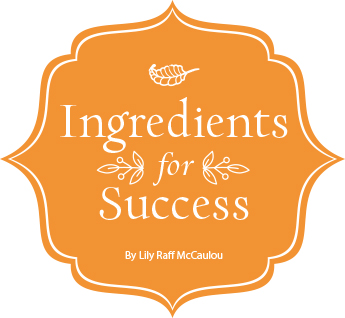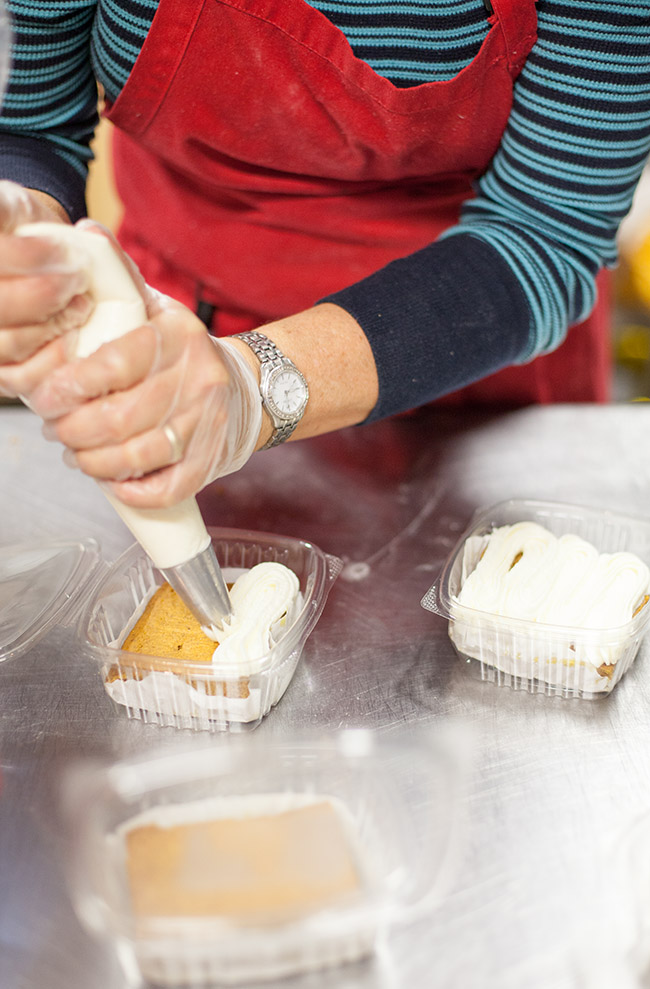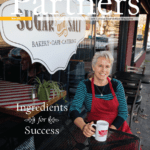Ingredients for success
Upcoming Tod and Maxine McClaskey Culinary Institute will be a plus for the regional cuisine and baking industry
By Lily Raff McCaulou
 Just as every chef has their own way of making a classic recipe, members of the local food industry have differing ideas about what a person needs to succeed. That industry encompasses more than ever before, from traditional restaurants to food trucks to artisanal charcuteries. Preparing students for such a diverse job market is a tall order that constantly changes, and one that Clark is fully prepared for.
Just as every chef has their own way of making a classic recipe, members of the local food industry have differing ideas about what a person needs to succeed. That industry encompasses more than ever before, from traditional restaurants to food trucks to artisanal charcuteries. Preparing students for such a diverse job market is a tall order that constantly changes, and one that Clark is fully prepared for.
Clark College is building its new recipe for cuisine and baking education from scratch. Two state-of-the-art kitchens, a restaurant, four kiosks and an outlet bakery, as well as a newly revamped curriculum with new faculty will be the results of four years of planning. Thanks to a $4 million gift from The Tod and Maxine McClaskey Family Foundation in December 2015, Clark is on its way to transforming its existing facility into a town square that will be a gathering place for students and the regional community. The Tod and Maxine McClaskey Culinary Institute will be served up in the spring of 2017.
“The landscape of culinary has been changing and evolving everywhere, but here in the Vancouver area, it’s even more evident because … we’re not afraid to look different, to do things differently,” said Aaron Guerra, Clark’s new Cuisine instructor.
Guerra is one of a handful of instructors tasked with developing a curriculum to prepare students for this brave new world. As an approved culinary evaluator, Guerra travels around the country to evaluate schools for the American Culinary Federation. Some of these visits inspired the new program, which is three-pronged, like a fork.
On the first tine are the fundamental cooking and baking practices, which will be taught at Clark using state-of-the-art equipment found in modern commercial kitchens. Alison Dolder, Clark’s professional baking and pastry arts instructor, said the baking courses are rearranged so students get more hours of instruction in each of five core areas.
“The structure of the curriculum and the instruction is really going back to the core fundamentals,” Dolder said.
The second tine is soft skills, such as multi-tasking and managing the stress of, say, a Saturday night dinner rush. These skills become increasingly important as the old barriers between the back of the house of a restaurant and the front of the house break down, according to Guerra. More eateries today have open kitchens, where cooks and dishwashers are visible to diners. Businesses have to be more brand savvy because any diner who has a bad experience could post a damaging review online.
“The reality today is that a cook in the back of the kitchen has to understand the brand (of his or her employer) and be a representative of that brand,” Guerra said.
The third tine involves time spent in busy kitchens at the campus restaurant and bakery outlet, which churn out affordable eats for the college community and provide real-work experience for Cuisine and Pastry Arts students.
“We have a campus-wide student body to feed,” Guerra said. “That gives us a production piece that most schools in the area can’t even come close to matching.”
The hope is that this new model is flexible enough to allow graduates to plunge their three-pronged education into any part of the industry that interests them and spear a successful, fulfilling career.
What the pros say
As a wholesale supplier of ingredients and supplies to local bakeries, Tim Briare, of BakeMark, sees firsthand the growing diversity of job prospects for Pastry Arts graduates. Artisan bakeries are milling their own flour using ancient grains, he said. Doughnut shops are becoming more creative, incorporating exotic flavors and artistic decorations. As a former baker, Briare is living proof that working behind a counter or in front of an oven isn’t the only path for someone with baking experience. And as a member of a Clark College Advisory Committee, he has watched Clark graduates find work in many corners of the industry.
In Briare’s opinion, success comes from understanding the fundamentals. “I think graduates from Clark College have been absorbed really quickly because they just understand the reality of baking,” Briare said. “They are truly well-trained.”
For Jeff Harvey, CEO of Burgerville LLC, the main ingredient for success in the food industry is a passion for service. While his company employs about 1,500 people, “I need probably only two people with a culinary education,” said Harvey.
But every single employee at the Vancouver-based fast food chain must come equipped with the right attitude and capacity to learn on the fly. That’s where those soft skills come in.
To encourage those behaviors, Burgerville takes a creative approach to hiring. The company uses a local improvisational comedy troupe to audition job applicants and then train its employees, he said.
For example, in a game called “Bunny Bunny,” coworkers sit in a circle and clap to a beat while taking turns pretending to be a bunny by wiggling their noses and positioning their fingers on their heads like ears. Using only eye contact, they then pass the acting assignment on to someone else. The game encourages employees to work together.
“One of the foundational premises of improv is ‘yes and,’ or, ‘always accept the offer.’ That’s a foundational premise of service too,” he said.
To Harvey, that kind of adaptability is increasingly important in the restaurant business, not just in fast food. Even some famous chefs no longer have brick and mortar restaurants, instead opting to open pop-up eateries and other temporary installations.
“Really, the trend is heading toward huge flexibility,” Harvey said.

Tierre Benton ’11 owner of Sugar and Salt Bakery, Café and Catering, prepares fresh treats for the day.
Even the culinary education landscape in the region is in flux right now. Le Cordon Bleu, a for-profit institute with 16 locations in the United States including one in Portland, is closing its doors around the same time that Clark’s new remodeled facility will open. School officials at Le Cordon Bleu cited changes in federal funding in 2015 that made it impossible for the school to continue doing business.
The high cost of secondary education and the subsequent debt assumed by students is a national debate. Portland State University is currently testing the feasibility of covering tuition and fees for qualifying students with a new “Four Years Free” initiative for incoming first-year students in Oregon. Local and national lawmakers are also calling for free access to community college education.
Cost is one of several areas in which community colleges hold an advantage over for-profit or state-supported schools.
Students at private institutions like the Portland campus of Le Cordon Bleu/Western Culinary paid $42,500 in tuition and fees—not including books and supplies—for their associate degree in Culinary Arts over a 21-month period, according to Genevieve Howard, dean of Workforce, Career and Technical Education at Clark College. Students who attended Oregon Culinary Institute paid $30,000 for tuition and fees and another $1,600 for books and supplies to obtain an associate degree in Culinary Management over 16 months, she said.
In comparison, in-state students at Clark College paid $11,700 in tuition and fees and $1,300 in books and supplies for their associate in Culinary Arts over a 20-month period before the program went on hiatus.
Lower costs mean students graduate with less debt and, ultimately, greater take-home pay, which is especially important in an industry that generally pays entry-level employees minimum wage. Restaurant cooks earned a median wage of $24,320 in 2015, according to the U.S. Bureau of Labor Statistics.
However, jobs and opportunities for career advancement are available for those with the aptitude and access to learn. Clark graduates will enter fields ready for jobs in baking and pastry arts, culinary, restaurant and catering management or as pastry chefs or culinary chefs. Jobs in those specific fields are expected to grow by eight percent in the next five years, creating an additional 1,928 jobs in the Portland-Vancouver Metro area, according to Howard citing figures from Economic Modeling Specialists International (EMSI).
By remodeling the existing facility and revamping its curriculum, Clark’s program will become relevant in the marketplace, while the location will serve as a town square for students and community members to gather, share healthy and fresh food, and exchange ideas.
Furthermore, the college will launch a new bachelor’s degree in January 2017, focusing on management skills. It will provide the level of education required for jobs in mid- to high-level management or running a business, according to Patti Serrano, director of the bachelor of applied science in Applied Management (BASAM) program.
“We have heard the demands from local businesses for this program, as well as from working adults who are seeking a bachelor’s program that fits with their schedules,” she said in a Clark College online story.
From baker to owner
Clark’s Culinary program first opened its doors in 1958. Two years ago, the college stopped accepting students to prepare for the new construction. When the program reopens in 2017, Cuisine and Professional Baking and Pastry Arts will offer a one-year certificate and a two-year associate degree. The programs will eventually enroll 70 first-year students and 50 second-year students. Once students complete their associate coursework, they will have the option of enrolling in the new bachelor’s program.
“People are thinking … ‘maybe I’ll be a baker or pastry chef for 15 years and then I’d like to go into something else,’” Dolder said. That something else could be an aspiration to be a manager or to open a retail store.
To Dolder, moving from a frontline, entry-level position into management is a realistic way of looking at a career in baking, which is, she said, “an incredibly physically demanding job.” It requires getting to work well before dawn and maneuvering heavy bowls and baking sheets in front of a hot oven all day.
Clark’s programs are designed to evolve over time. Guerra is spearheading an agronomy effort to involve Cuisine students in the progress of their food before and after it reaches the kitchen. Guerra said he envisions something even more intricate than a farm-to-table concept; instead, there could be campus gardens that serve as the classroom for lessons in soil science, composting and agricultural systems. Dolder is looking to partner with local farms to source eggs and butter.
Dolder said people on campus tell her frequently how anxious they are for the bakery to reopen. She conveys to them that in about a year, patrons will experience a whole new presentation of the delicious treats, from windows that will reveal the bustling kitchen to a delightful chocolate lab. They’ll also be able to buy wheat-free offerings as students learn about how to prepare a larger variety of popular gluten-free products. The people who stop Dolder on campus say they simply miss the crisp and chewy macaroons. She tells them that the wait isn’t long now.
“People love this program, we know they do, and we take a lot of satisfaction in hearing that,” Dolder said. “Bakers like to make people happy.”
| There are many opportunities to take part in the creation of the Tod and Maxine McClaskey Culinary Institute. Learn about the available philanthropic levels by contacting Joel B. Munson, Sr. VP of development at 360.992.2428. |
Lily Raff McCaulou is a journalist living in Portland, Ore. She is the author of “Call of the Mild: Learning to Hunt My Own Dinner,” which the San Francisco Chronicle named one of the best books of 2012. She has written for The New York Times and The Atlantic.
12/15/2016



